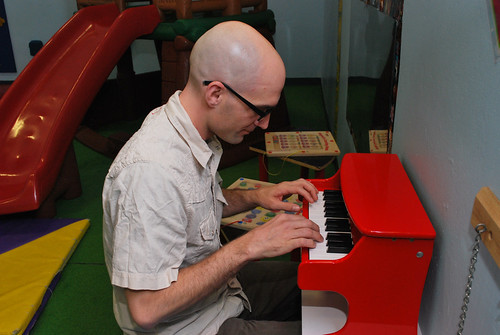
{Photo by rocketlass.}
The best thing about the NYRB Classics book club--aside, that is, from knowing that once a month I'll get an NYRB Classic in the mail--is that the books they send aren't always ones I would have bought. I buy a lot of NYRB Classics, to the point that our house currently has twelve feet of shelf space dedicated to the series, but even so I don't come close to bringing home their entire list. Yet their editorial judgement is so reliable that I know I'm missing good books--and the book club offers a small step toward preventing that.
The best example thus far is Dorothy Baker's Young Man with a Horn (1938), which I was quoting on Twitter all morning. Had I seen it in the store, I would have passed it right by, assuming it would be yet another cliched jazz novel about a talented but tormented soul . . . well, I'll just let Gary Giddens tell it:
The Jazz Novel, especially as produced by white writers, was not simply a novel set in the jazz world. It became associated with a rote cycle of banalities centered on a doomed, misunderstood genius, white or black; a wise black mentor or worshipful white acolyte; competing women (nice and marriageable versus evil and sexy); and friends who try in vain to impede his tragic demise. The hero is usually fixated on hitting a fatal high note, consumes alcohol or drugs, and is given to shuffling alone in the rain.That's from Giddens's afterword, and it pretty much nails it. Nails, that is, what ails your typical jazz novel--none of which is a problem in Young Man with a Horn. Some of the elements are there: a drink-sodden hero, well-meaning friends, a high note. But none of them feels wrong, none feels unearned or overly demonstrative. Instead, what Baker gives us is a story of obsession that we can believe in, a man who only really comes alive when playing music and is essentially unfitted for the world in every other regard. As Baker offers brief, disconnected scenes from her trumpet player's life, some important, some not, she weaves what Giddens describes as a "sustained elegy," making us mourn his clearly inevitable demise because she makes us believe in his genius--and, more important his, bone-deep love of the music.
So if you're looking for a holiday gift for a reading friend that's on the cheap side, grab Young Man with a Horn. Or if you're up for spending more, plump for a six-month book club subscription. Maybe your friend will lend them all to you after he's done reading.
No comments:
Post a Comment